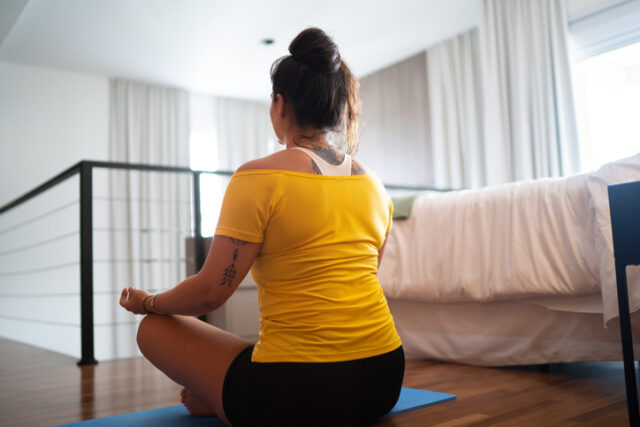Ethics and religion aren’t mutually exclusive.

If you were raised religiously on tenets like “Do to others as you would have them do to you,” and “Love thy neighbor,” it might be hard to imagine living an ethical life without religion. But chances are, you have a few friends and coworkers who are not religious yet are also kind and moral. So how do they do it?
It might surprise you to find out that most secular people use the same techniques religious people do to lead a moral life: keep a supportive group of people around them, have discussions about morality, take care of their mental health, express themselves through art, and participate in routine activities that nurture their inner selves. While religion is an excellent framework for ethical living, there are many different ways to live a good life. Here are some of them.
1. Find Community

No matter your stance on a higher power, we all need social support of some kind. The benefit of Church, Temple, and the like is that they are a built-in community you can access, regardless of what city you’re living in. A non-religious person finds the same kind of support in sports, clubs, music, tabletop roleplaying games, or simply a tight-knit group of friends. These social circles help form and reinforce positive values.
2. Read Widely

There are many ethical guides besides the Bible, Quran, and other religious texts. Agnostics and atheists find moral guidance in a variety of books such as The Moral Landscape by Sam Harris, Meditations for the Humanist by A.C. Grayling, and The Ethics of Authenticity by Charles Taylor, to name just a few.
3. Explore Philosophy

People have long debated ethics through philosophy. Plato asserted that the goal of moral thought is happiness and that your virtues are the skills needed to get there. Many non-religious people still learn from the teachings of Plato, Socrates, and more modern philosophers like Gertrude Elizabeth Margaret Anscombe, and Carl Jung.
4. Have Tough Discussions

Just like Bible study, secular people often thrive on deep discussions and arguments about morals and ethics. What does it mean to be a good person? It is a question as old as humanity. Many ways to discuss ethical dilemmas, such as the classic Trolley Problem, were created by atheists and philosophers like Phillipa Foot.
5. Self-Examination

Though secular people don’t have a forum to confess their sins, if they want to lead an ethical life, they conduct some form of self-examination regularly. This may look like a meditation practice, journaling, or having vulnerable conversations with their loved ones. Whatever method a non-religious person chooses, their values will be uncovered during these moments of self-reflection.
6. Incorporate a “Spiritual” Routine

As humans, we are all creatures of habit. Most religions have both weekly days set aside for rest and worship, as well as holidays, spaced throughout the year. Most atheists and agnostics also have routine rest days and healthy activities they do regularly. Whether it’s exercise, getting into nature, or playing music, most non-religious people have found something to keep their balance between mind, body, and spirit.
7. Invest in Mental Health

Secular individuals realize the importance of keeping a healthy mind as much as religious individuals. When anxiety, depression, and other mental illnesses overwhelm us, we can make poor decisions. Where religious people will turn to their congregation and their priest, rabbi, etc., agnostics and atheists will also draw on their communities for someone to talk to about their problems and often have a therapist, counselor, or psychiatrist as well.
8. Self-Expression

Many agnostics and atheists express themselves through some sort of art as a way to explore their values and morals. Tied to both mental and spiritual health, dancing, painting, writing, welding, playing music and so many other forms of self-expression are great ways to demonstrate values like love, peace, and kindness.
9. A List of Core Values

While not every non-religious person has a set of values they have written down like the Ten Commandments, those who are particularly mindful about living ethically can list them if asked. Most have discussed and thought about their values extensively. Being able to name their values makes for a solid moral foundation.
10. Practice Meditation (or Something Similar)

Most religious people will cite prayer as a vital part of their faith and one of the best ways to develop a close, personal relationship with God. Plenty of non-religious people find a similar need for quiet contemplation to discover their true wants and needs. Meditation, tai chi, yoga, and similar practices can give secular individuals feelings of peace and calm that fuel an ethical lifestyle.
11. Develop Intuition

Intuition is the inner guide that many non-religious people would say is their moral compass. Getting into the habit of listening to the little voice or gut feeling they get when deciding is usually imperative for secular individuals. Without an inner guide, it’s all too easy to make one bad decision after another.
12. Embrace Change

The road to creating a moral code is long and winding. Whether a religious practitioner or not, our understanding of different philosophies and ethical dilemmas is likely to change over time. Without the throughline of a particular religion, secular people have to be adaptable and able to modify their core values as their understanding changes.
13. Seek Feedback

Ethics and morality don’t form in a vacuum. As a social species, we have tendencies to treat those in our social circle with kindness and respect, but we need to learn how to extend those tendencies beyond our family and close friends. For agnostics and atheists, this means asking for feedback from their inner circle. Who else is going to tell them that they’re being a jerk except their real friends?
14. Accept Different Points of View

I’m sure we’re all aware that a good portion of the population struggles with accepting other people’s perspectives when they differ from theirs. However, this kind of acceptance is how many secular individuals develop their morality. They seek a variety of opinions and viewpoints to help them question or solidify their internal values.
15. Walk the Walk

The most important way people live ethically without religion is by actually practicing values of compassion, respect, and fairness out in the world. Ethics are useless without practical application. Whether your morality is guided by God or not, I think we can all agree that we know a good person by their words and actions.
Enjoy this piece? Give it a like and follow PsychLove on MSN for more!




